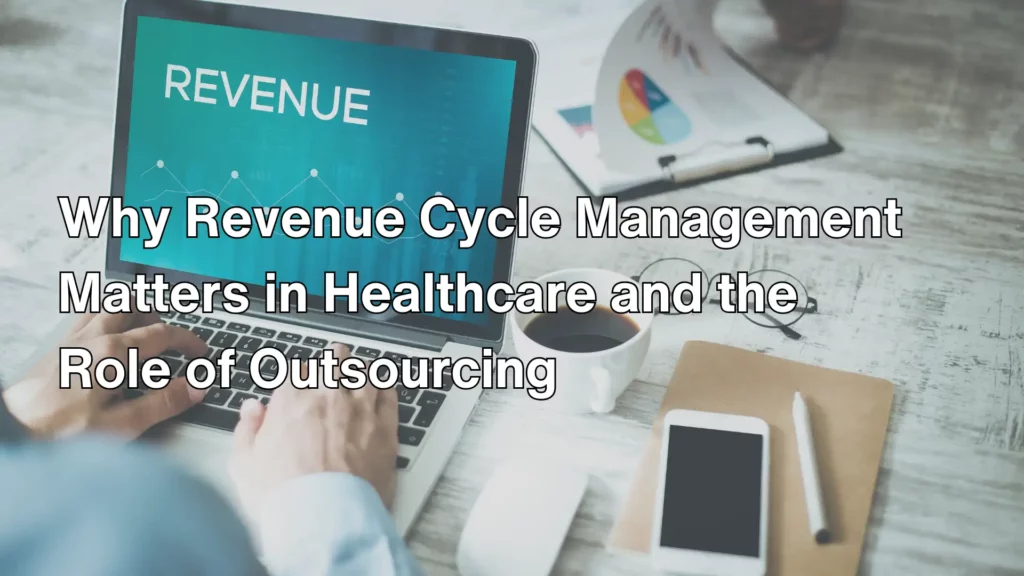We equip you with outsourcing solutions distinctly designed for your business and your customers’ needs.

Going to the doctor is supposed to be about getting the care you need – but behind the scenes, a whole process makes it possible for healthcare providers to get paid for their services. It’s called medical revenue cycle management (RCM), covering everything from scheduling your appointment to making the final payment. If this system isn’t running smoothly, healthcare providers might face financial difficulties, which can ultimately impact the care they can provide.
That’s why many healthcare organizations are outsourcing their RCM. It helps cut costs, reduce errors, and keep payments coming in on time. Here’s a closer look at RCM, why it matters, the common challenges providers deal with, and how healthcare process outsourcing can make a big difference.
Medical revenue cycle management is the process healthcare providers use to handle all financial tasks related to patient care. It starts when a patient makes an appointment and ends when the provider receives full payment for the services given. This cycle includes checking insurance details, coding medical procedures, submitting claims to insurance companies, and collecting patient payments.
A well-managed RCM system helps healthcare providers avoid delayed payments, billing mistakes, and lost revenue. In a world where healthcare rules and medical codes change often, managing this process well is more important than ever.
Medical revenue cycle management (RCM) involves several steps, and each needs to be done right to keep the financial side of healthcare running smoothly:
When every stage of the RCM process is handled correctly, healthcare organizations can stay financially healthy and focus on what matters – caring for their patients.
Managing a healthcare revenue cycle isn’t easy. Many challenges can slow down payments or cause financial losses:
Healthcare regulations constantly change, so providers must stay updated to keep their processes compliant.
Improving the RCM process doesn’t have to be complicated. Regular staff training is a great place to start since billing rules and coding standards change often. Ongoing education helps reduce mistakes and keeps everyone on the same page.
Technology can also make a big difference. Automated billing systems help reduce human errors, speed up claims, and track issues in real time.
Regular audits are another simple way to improve the process. They can reveal recurring mistakes, like coding errors or delayed payments, so providers can fix problems early.
Clear communication with patients also matters. Medical bills can be confusing, so explaining costs upfront, offering flexible payment options, and providing online portals can improve patient satisfaction and make collections easier.
 Outsourcing RCM tasks to a specialized company can make a big difference, especially for healthcare providers who don’t have the resources to manage these tasks in-house. Here are some reasons why outsourcing works:
Outsourcing RCM tasks to a specialized company can make a big difference, especially for healthcare providers who don’t have the resources to manage these tasks in-house. Here are some reasons why outsourcing works:
Outsourcing RCM services can give healthcare providers a solid financial boost. Professional teams use advanced software and efficient processes to submit claims accurately, which helps payments come through faster.
It also improves cash flow, providing payments are collected on time so providers can invest in equipment, staff, and patient care.
Compliance becomes less of a headache, too. RCM companies stay updated on changing regulations to help avoid fines or legal trouble.
Plus, outsourcing helps catch billing mistakes that might go unnoticed, preventing revenue leaks and keeping finances on track.
Medical revenue cycle management is key to keeping a healthcare provider financially healthy, but handling it in-house can be time-consuming, expensive, and downright stressful.
That’s where Peak Outsourcing comes in. Our experienced professionals use innovative technology and proven strategies to handle every step of the RCM process. We help healthcare providers reduce errors, speed up payments, and comply with industry regulations.
Let us handle the numbers so you can focus on your patients. Contact us today to learn more about how we can support your organization’s success.
Your company may benefit from outsourcing certain functionality that you currently perform in-house. The resulting benefits can transform the way you do business and provide a greater focus on your core business functions.
Submit a contact form or call Peak Outsourcing today at